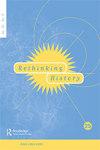人类世是一个历史的超客体
IF 0.8
2区 历史学
Q1 HISTORY
引用次数: 0
摘要
摘要在过去的几十年里,人类世的概念在许多学术学科中获得了发展。然而,历史,无论是作为一门人类科学还是作为一个政治框架,似乎都无法接受这个人类与自然之间的区别模糊的新地质时代。本文运用“超对象”的概念,认为这种碰撞不是偶然的,也不是史学滞后的结果。相反,它与认识论限制(与时间尺度、文献和领域自主问题有关)和政治问题(与人类能动性和普遍性有关)有关。总之,后人类主义的潜在替代方案被认为是维护学科基础和建立后人类中心主义方法的一种方式。本文章由计算机程序翻译,如有差异,请以英文原文为准。
The Anthropocene as a historical hyperobject
ABSTRACT The notion of the Anthropocene has gained momentum in many academic disciplines in the last couple of decades. Yet it seems that history, both as a human science and a political frame, fails to come to terms with this new geological epoch in which the distinction between humanity and nature blurs. Employing the concept of ‘hyperobject’, this article argues that such collision is not an accident or the result of historiography lagging behind. Rather, it is linked to both epistemological limits (related to time-scale, documentary and field autonomy issues) and political questions (related to human agency and universality). In conclusion, potential alternatives to posthuman anthropocenism are considered as a way to both maintain the foundations of the discipline and build post-anthropocentric approaches.
求助全文
通过发布文献求助,成功后即可免费获取论文全文。
去求助
来源期刊

Rethinking History
Multiple-
CiteScore
1.20
自引率
0.00%
发文量
26
期刊介绍:
This acclaimed journal allows historians in a broad range of specialities to experiment with new ways of presenting and interpreting history. Rethinking History challenges the accepted ways of doing history and rethinks the traditional paradigms, providing a unique forum in which practitioners and theorists can debate and expand the boundaries of the discipline.
 求助内容:
求助内容: 应助结果提醒方式:
应助结果提醒方式:


